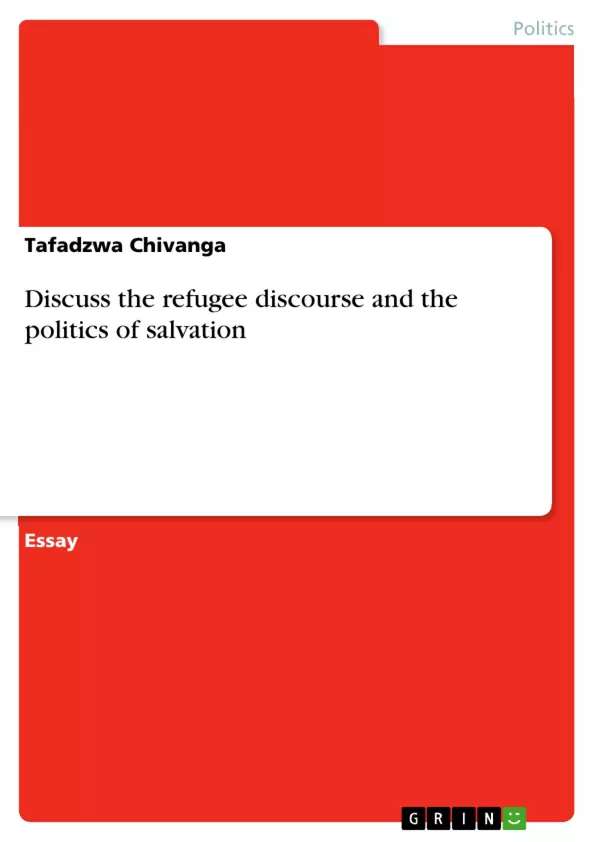The "refugee" label has been politicised and is often misconstrued by various actors to advance their positions at the expense of the rights and autonomy of the refugees themselves. Zetter (2007) avers that the refugee label has been politicised by the reproduction of institutional fractioning and by embedding the wider political discourse of resistance to migrants and refugees. This paper posits that refugees are rational actors who possess a sense of agency and should have their own autonomy.
They should not be continuously subjected to the dependency syndrome that typifies them as defenceless and defines processes of humanitarian intervention without giving them due recognition. The paper will initially analyse how the refugee discourse treats refugees as needing salvation. It also theoretically analyses the frameworks in the doctrine of refugees by critically assessing the politicization of the refugees discourse. Secondly the paper will draw in case studies showing how the refugees possess agency. The paper will then conclude by outlining the advantages of viewing refugees as rational beings with the ability to determine their paths for survival and contribute to socioeconomic growth.
Inhaltsverzeichnis (Table of Contents)
- Introduction
- Definition of key terms
- Bottom-up Approach
- Sphere project
- Refugee
- Definition of key terms
- Theoretical framework
- Structuration theory
- Labelling theory
- Dramaturgical theory
- Refugees as defenceless
- Immigration detention centres
- Media images
- Statistical inaccuracies
- Humanitarian aid
- Refugees as rational actors
- Women's embroidery workshops
- Redefining gender identities
- Refugees as economic drivers
- Education as empowerment
- Financial remittances
- I am an immigrant campaign
Zielsetzung und Themenschwerpunkte (Objectives and Key Themes)
This paper aims to challenge the perception of refugees as solely dependent and in need of salvation by presenting them as rational actors with agency and the ability to contribute to their own survival and socioeconomic growth. It analyzes the problematic discourse that portrays refugees as defenceless, focusing on the use of media imagery, the influence of labels, and the limitations of humanitarian assistance.
- The politicization of the "refugee" label and its impact on refugee autonomy.
- The role of structural forces and human agency in shaping refugee experiences.
- The impact of media representations on perceptions of refugees.
- The potential for refugees to contribute to economic development.
- The importance of recognizing refugees as diverse individuals with unique needs and aspirations.
Zusammenfassung der Kapitel (Chapter Summaries)
- Introduction: This chapter introduces the concept of the "refugee" label as a politicized term that can undermine refugee autonomy. It argues that refugees are rational actors who possess agency and should not be treated as solely dependent on humanitarian aid.
- Definition of Key Terms: This chapter defines key terms such as "bottom-up approach," "Sphere project," and "refugee," highlighting the complexities and limitations of these concepts in understanding the refugee experience.
- Theoretical Framework: This chapter introduces the theoretical frameworks that underpin the paper's analysis, including structuration theory, labeling theory, and dramaturgical theory. It explains how these theories can help understand the interplay between structure and agency in shaping refugee experiences.
- Refugees as Defenceless: This chapter examines the dominant discourse that portrays refugees as defenceless and in need of salvation. It critiques the use of media imagery, immigration detention centres, and statistical inaccuracies in perpetuating this negative representation.
- Refugees as Rational Actors: This chapter presents case studies that demonstrate refugees' agency and ability to contribute to their own survival and socioeconomic growth. It highlights initiatives like women's embroidery workshops, refugee-led economic projects, and educational empowerment programs.
Schlüsselwörter (Keywords)
The paper focuses on key themes such as refugee autonomy, agency, humanitarian discourse, media representation, structural forces, labeling theory, and the economic contributions of refugees.
- Arbeit zitieren
- Tafadzwa Chivanga (Autor:in), 2015, Discuss the refugee discourse and the politics of salvation, München, GRIN Verlag, https://www.grin.com/document/353654



